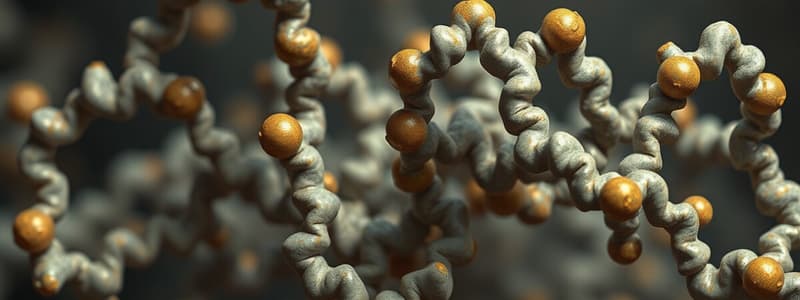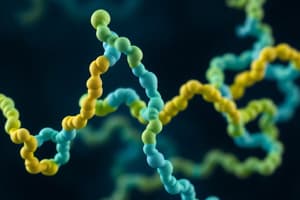Podcast
Questions and Answers
Which of the following applies to the structure of the isoleucine side chain? (Select all that apply)
Which of the following applies to the structure of the isoleucine side chain? (Select all that apply)
- Contains the sulfhydryl group
- Contains a branched hydrocarbon chain (correct)
- Contains a positively charged side chain
- Contains an aromatic ring
Which of the following applies to the structure of the phenylalanine side chain? (Select all that apply)
Which of the following applies to the structure of the phenylalanine side chain? (Select all that apply)
- Contains an aromatic ring (correct)
- Contains the sulfhydryl group
- Contains a branched hydrocarbon chain
- Contains a positively charged side chain
Which of the following applies to the structure of the methionine side chain? (Select all that apply)
Which of the following applies to the structure of the methionine side chain? (Select all that apply)
- Contains an aromatic ring
- Contains a branched hydrocarbon chain
- Contains the sulfhydryl group
- Contains a sulfomethyl group (correct)
Which of amino acids has the basic properties? (Select all that apply)
Which of amino acids has the basic properties? (Select all that apply)
Stereoisomers exist for all amino acids, except:
Stereoisomers exist for all amino acids, except:
Lysine, arginine and __________ have no charge in the weakly alkaline medium:
Lysine, arginine and __________ have no charge in the weakly alkaline medium:
All of these amino acids are hydrophobic (nonpolar), except:
All of these amino acids are hydrophobic (nonpolar), except:
The primary structure of the protein is:
The primary structure of the protein is:
The primary structure of a protein:
The primary structure of a protein:
The basis of the protein primary structure is:
The basis of the protein primary structure is:
What types of relationships or interactions are characteristic of the protein primary structure?
What types of relationships or interactions are characteristic of the protein primary structure?
Peptide bond in a protein:
Peptide bond in a protein:
Salting-out is one of the methods used for protein isolation. Which protein properties most depend on the concentration of salts?
Salting-out is one of the methods used for protein isolation. Which protein properties most depend on the concentration of salts?
To obtain a native protein one can use the following method:
To obtain a native protein one can use the following method:
Which of these methods results in a reversible precipitation of the protein?
Which of these methods results in a reversible precipitation of the protein?
Choose a salt for reversible protein precipitation:
Choose a salt for reversible protein precipitation:
Choose a salt for irreversible protein precipitation:
Choose a salt for irreversible protein precipitation:
What happens to the protein at high temperature in the presence of hydrochloric acid?
What happens to the protein at high temperature in the presence of hydrochloric acid?
One of the steps in studying the protein amino acid composition is its splitting into smaller peptides. For this purpose, it is possible to use:
One of the steps in studying the protein amino acid composition is its splitting into smaller peptides. For this purpose, it is possible to use:
The interaction __________ is the basis of Western blot:
The interaction __________ is the basis of Western blot:
An antibody labeled with an enzyme or isotope is called:
An antibody labeled with an enzyme or isotope is called:
AIDS diagnosis by Western blot analysis includes all of the steps, except:
AIDS diagnosis by Western blot analysis includes all of the steps, except:
The mixture of proteins was treated with sodium dodecyl sulfate and subjected to polyacrylamide gel electrophoresis (PAGE). The protein mobility in this electrophoresis depends on:
The mixture of proteins was treated with sodium dodecyl sulfate and subjected to polyacrylamide gel electrophoresis (PAGE). The protein mobility in this electrophoresis depends on:
The mixture of proteins was treated with sodium dodecyl sulfate, applied to the polyacrylamide gel and separated by electrophoresis (PAGE). The proteins:
The mixture of proteins was treated with sodium dodecyl sulfate, applied to the polyacrylamide gel and separated by electrophoresis (PAGE). The proteins:
What does 'the protein tertiary structure' imply?
What does 'the protein tertiary structure' imply?
Flashcards are hidden until you start studying
Study Notes
Isoleucine and Phenylalanine Side Chains
- Isoleucine features a branched hydrocarbon chain, important for its hydrophobic properties.
- Phenylalanine contains an aromatic ring, contributing to its unique biochemical behavior.
Methionine Side Chain Structure
- Methionine includes a sulfomethyl group, distinguishing it from other amino acids with different functional groups.
Basic Properties of Amino Acids
- Histidine is recognized for its basic properties, impacting its role in protein structures and functions.
Stereoisomers in Amino Acids
- Glycine is the only amino acid without stereoisomers due to its non-chiral structure.
Charge in Weakly Alkaline Medium
- Histidine, along with lysine and arginine, exhibits no charge in mildly alkaline conditions, affecting its reactivity.
Hydrophobic Amino Acids
- Among listed amino acids, lysine is not hydrophobic (nonpolar), contrasting with the others like tryptophan and phenylalanine.
Primary Structure of Proteins
- Defined as the linear sequence of amino acids connected by peptide bonds, crucial for understanding protein function.
- Stabilized by peptide bonds formed between the α-amino and α-carboxyl groups of amino acids.
Basis of Protein Primary Structure
- Composed primarily of polypeptide chains, which determine protein identity and function.
Characteristic Interactions in Primary Structure
- Involves relationships between the α-amino and α-carboxyl groups, reflecting the covalent nature of peptide bonds.
Peptide Bond Properties
- Peptide bonds possess partial double bond characteristics, leading to rigidity in protein structures and limiting rotation.
Salting-Out Method in Protein Isolation
- Degree of hydration of proteins is influenced by salt concentration, which is critical for successful protein isolation.
Obtaining Native Proteins
- Sedimentation by salts of alkaline-earth metals is an effective method to achieve native protein structures.
Reversible Protein Precipitation
- Ammonium sulfate precipitation is a reversible process, enabling the recovery of proteins without permanent denaturation.
Irreversible Protein Precipitation
- Silver nitrate is used for irreversible protein precipitation, often leading to protein denaturation.
Effects of High Temperature with Hydrochloric Acid
- High temperatures in the presence of hydrochloric acid result in hydrolysis of proteins, damaging their structure.
Peptide Bond Cleavage
- Chymotrypsin is utilized to split proteins into smaller peptides, aiding in the analysis of amino acid composition.
Western Blot Interactions
- The antigen-antibody interaction forms the basis of the Western blot technique, crucial for protein detection.
Molecular Probes in Diagnostics
- Enzyme or isotope-labeled antibodies are referred to as molecular probes, enhancing sensitivity in detection assays.
Steps in AIDS Diagnosis via Western Blot
- Steps include applying molecular probes, separating proteins by molecular weight, and autoradiography; salting-out is not typically included.
Protein Mobility in PAGE
- Protein mobility during polyacrylamide gel electrophoresis (PAGE) is primarily influenced by molecular weight, determining the separation efficacy.
Electrophoresis Movement
- Proteins treated with sodium dodecyl sulfate (SDS) migrate towards the anode during electrophoresis, as they acquire a negative charge.
Tertiary Structure of Proteins
- The tertiary structure refers to the three-dimensional arrangement of the entire polypeptide chain, crucial for protein functionality.
Studying That Suits You
Use AI to generate personalized quizzes and flashcards to suit your learning preferences.




